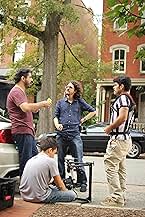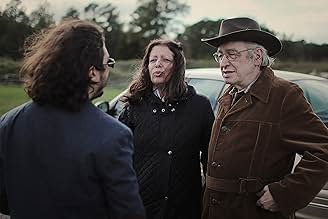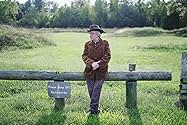The Garden of Afflictions
- 2017
- 1h 21m
IMDb RATING
6.2/10
1.3K
YOUR RATING
Brazilian philosopher Olavo de Carvalho's thinking, presented through his presence, his daily work routine and his family life in Virginia (USA).Brazilian philosopher Olavo de Carvalho's thinking, presented through his presence, his daily work routine and his family life in Virginia (USA).Brazilian philosopher Olavo de Carvalho's thinking, presented through his presence, his daily work routine and his family life in Virginia (USA).
- Awards
- 3 wins
- Director
- Writer
- All cast & crew
- Production, box office & more at IMDbPro
Storyline
Featured review
A name should be mentioned as we approach cultural valorization and rescue, vis-a-vis the recent domination by the leftist Cultural Marxism in main sectors of the society. That name is Olavo de Carvalho (1947-2022), who needs no introduction. Faced with the hegemony of the PT Regime in Brazil (2004-2016), he consequently repelled the so-called Bolivarian movement and fought against the widespread corruption via billionaire bribes that devastated the Brazilian nation. Social networks and public marches adopted the phrase "Olavo is right!", to suggest the misrule and to denounce the general cultural downgrade. Carvalho's geopolitical analyzes proved accurate. He was right to insist on the importance of the São Paulo Forum, an international revolutionary organization to which the Bolivarian allies have aligned themselves since the end of last century. O Jardim das Aflições, an emblematic book, actually the author's favorite, gave the title to this documentary directed by Josias Teófilo. It was produced via crowdfunding without a penny of public money. It is not a reproduction of the original book, published in 1995. But its basic thesis echoes the original essay. The history of the West has been marked by the idea of an Empire and successive attempts at its restructuring. With different approaches, there was always a unique objective - to extend the imperial (imperialist?) domains to the limits of the visible, geopolitical and social world. Carvalho's essay examined whether it was necessary to (i) revise such thesis and (ii) assess the extent to which it would relate to current world scenarios. Critics, within their dutiful corporate media and their unfailing rancor, said this film "is never transcendent". Heck... Quite the opposite is true. The Garden is a kind of hour-and-a-half master-class on spirituality where Mr. Carvalho is personified by his own presence, work routine and family life. "The greatest existing force is personality," he advises us, among other practical, religious and metaphysical teachings. The film is based on the following themes: (i) the symbolism of gardens in the philosophical tradition, Epicurus' Garden of Delights, the Garden of Eden from the book Genesis, the garden of afflictions in the contemporary world and the physical 'garden' in Virginia (USA). ) where the philosopher lived; (ii) individual freedom and the oppression of the collective dictatorship; (iii) Aristotelian thought, and (iv) an eventually central theme in philosophical thought in general (see Plato, Schopenhauer, etc.): death.
What ideas are still important to us in the face of inevitable death? What are you going to do with your life while there's still time? Carvalho, like his predecessor Mario Ferreira dos Santos (1907-1968), is a philosopher that "Brazilian culture" cannot - or refuses - to absorb. Both hover above institutionalized national consciousness as kinda extraterrestrials, while below them the establishment and its educational forms 'take care' of citizenship.
Of course, you can't judge a person by the size of his library. (Otto Maria Carpeaux's library, for example, was surprisingly small, considering that its owner had written "History of Western Literature" and was one of the greatest encyclopedic minds in Brazilian culture.) But Olavo's library is impressive in itself. Throughout the film, he briefly discusses, in addition to his pillars Plato and Aristotle: Eric Voegelin, Ortega y Gasset, Saint Augustine, Anaximander, Boethius, Josiah Royce, Antonio Gramsci, Raymundo Faoro and many others.
This film opens up the philosopher's personality. It crystallizes his wisdom, elevation and lucidity in his permanent search for truth, which is of course the primary objective of every philosopher worthy of such an epithet.
Accessible to a wide cultural spectrum of the public (not just film critics!), this is an objective, restricted, and even comparatively unpretentious document.
What ideas are still important to us in the face of inevitable death? What are you going to do with your life while there's still time? Carvalho, like his predecessor Mario Ferreira dos Santos (1907-1968), is a philosopher that "Brazilian culture" cannot - or refuses - to absorb. Both hover above institutionalized national consciousness as kinda extraterrestrials, while below them the establishment and its educational forms 'take care' of citizenship.
Of course, you can't judge a person by the size of his library. (Otto Maria Carpeaux's library, for example, was surprisingly small, considering that its owner had written "History of Western Literature" and was one of the greatest encyclopedic minds in Brazilian culture.) But Olavo's library is impressive in itself. Throughout the film, he briefly discusses, in addition to his pillars Plato and Aristotle: Eric Voegelin, Ortega y Gasset, Saint Augustine, Anaximander, Boethius, Josiah Royce, Antonio Gramsci, Raymundo Faoro and many others.
This film opens up the philosopher's personality. It crystallizes his wisdom, elevation and lucidity in his permanent search for truth, which is of course the primary objective of every philosopher worthy of such an epithet.
Accessible to a wide cultural spectrum of the public (not just film critics!), this is an objective, restricted, and even comparatively unpretentious document.
Details
- Release date
- Country of origin
- Official sites
- Language
- Also known as
- O Jardim das Aflições
- Filming locations
- Production company
- See more company credits at IMDbPro
Box office
- Budget
- R$315,000 (estimated)
- Runtime1 hour 21 minutes
- Color
Contribute to this page
Suggest an edit or add missing content

Top Gap
By what name was The Garden of Afflictions (2017) officially released in Canada in English?
Answer
















